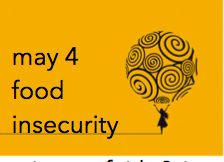We continue our worship series, The Art & Resurrection of Justice, this week with focus on Food Insecurity.
Outline for The Art & Resurrection of Justice
•april 27: human trafficking (John 20.19-31)
•may 4: food insecurity (Luke 24.13-49)
•may 11: listening to the voiceless (John 10.1-10)
Worship this Sunday will hold the story of Emmaus (Luke 23.13-49) in conversation with food insecurity and the recent documentary A Place at the Table. We encourage you to view the documentary if you are able. The film is available on DVD and iTunes.
Read Luke 24.13-49.
The story of the Risen Christ on the road to Emmaus states, “But [the two walking on the road to Emmaus] urged [the Risen Christ] strongly, saying, “Stay with us, because it is almost evening and the day is now nearly over.” So he went in to stay with them. When he was at the table with them, he took bread, blessed and broke it, and gave it to them. Then their eyes were opened, and they recognized him; and he vanished from their sight” (Luke 24.29-31).
Think of a meal you have shared with others in which your eyes were opened. Who was present? What was happening? How did breaking bread shape your capacity to see differently? Have you ever experienced the power and hope of resurrection while breaking bread?
The introduction to A Place at the Table states: “Fifty million people in the U.S.—one in four children—don’t know where their next meal is coming from. Directors Kristi Jacobson and Lori Silverbush examine the issue of hunger in America through the lens of three people struggling with food insecurity: Barbie, a single Philadelphia mother who grew up in poverty and is trying to provide a better life for her two kids; Rosie, a Colorado fifth-grader who often has to depend on friends and neighbors to feed her and has trouble concentrating in school; and Tremonica, a Mississippi second-grader whose asthma and health issues are exacerbated by the largely empty calories her hardworking mother can afford. Ultimately, A Place at the Table shows us how hunger poses serious economic, social and cultural implications for our nation, and that it could be solved once and for all, if the American public decides — as they have in the past — that making healthy food available and affordable is in the best interest of us all.”
Have you ever experienced hunger yourself? If so, how did the experience impact you physically and emotionally and spiritually?
How are currently eating in a healthy and sustainable way? What changes, if any, have you made in the last few years? What changes would you like to make? How might you support the availability of healthy and sustainable food for all?


0 Comments